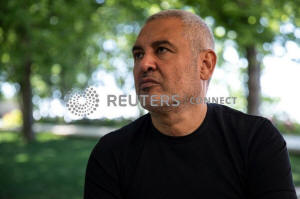'We must go on,' says Lebanese designer Elie Saab after blast
 Send a link to a friend
Send a link to a friend
 [August 18, 2020]
By Ayat Basma and Charlotte Bruneau [August 18, 2020]
By Ayat Basma and Charlotte Bruneau
BEIRUT (Reuters) - It felt like an eternity
rather than just a few minutes as haute couture fashion designer Elie
Saab scrambled to make sure his 200 staff members, including his son,
were safe when this month's massive explosion shook Beirut.
Like many Lebanese on Aug. 4 when chemicals at the port detonated, the
56-year-old felt the blast was on his doorstep.
"I saw my son covered in blood, I could not believe it. I said okay, he
is wounded, but it was okay, it was just cuts to his head and arms,"
Saab said.
"But it was 15 minutes that felt like two days long. It was not just
because it is a father and son thing, it was because we all work
together like one family under one roof."
The explosion killed 178, injured 6,000 and damaged whole neighbourhoods.

Saab said his main office and headquarters were badly damaged. His home
a few hundred metres from the port, was gutted.
The blast destroyed the shops and ateliers of at least two other
designers, Zuhair Murad and Rabih Keyrouz, himself badly injured.
Saab is no stranger to devastation. He started his label in 1982, at the
height of Lebanon's 1975-1990 civil war.
The Aug. 4 blast revived those memories.
[to top of second column]
|

Lebanese fashion designer Elie Saab looks on during an interview
with Reuters, following a massive explosion at the Beirut port area,
in Faqra, Lebanon, August 15, 2020. REUTERS/Alkis Konstantinidis

"It was the same smell, the same dust, the broken glass. Honestly,
we did not want to relive this and it was not necessary," he said.
"This is a huge setback but we have to be like Beirut - every time
dusting itself off and returning to the way it was," Saab said.
Saab's team plan to go back to their offices from Aug. 20 to meet a
deadline for the September Paris couture show.
He also plans to rebuild his residence, with its high ceilings and
arches, marble columns and Arabesque tiles. For now, rubble and dust
were everywhere.
"We must go on ... It does not become us as Lebanese to give up,"
Saab said. "That is the doable part. But the biggest loss is the
people you can't bring back."
On a table lay a record by singer Fairouz, "Lebanon Forever". It was
broken in two.
(Reporting by Ayat Basma and Charlotte Bruneau; Editing by Giles
Elgood)
[© 2020 Thomson Reuters. All rights
reserved.] Copyright 2020 Reuters. All rights reserved. This material may not be published,
broadcast, rewritten or redistributed.
Thompson Reuters is solely responsible for this content. |